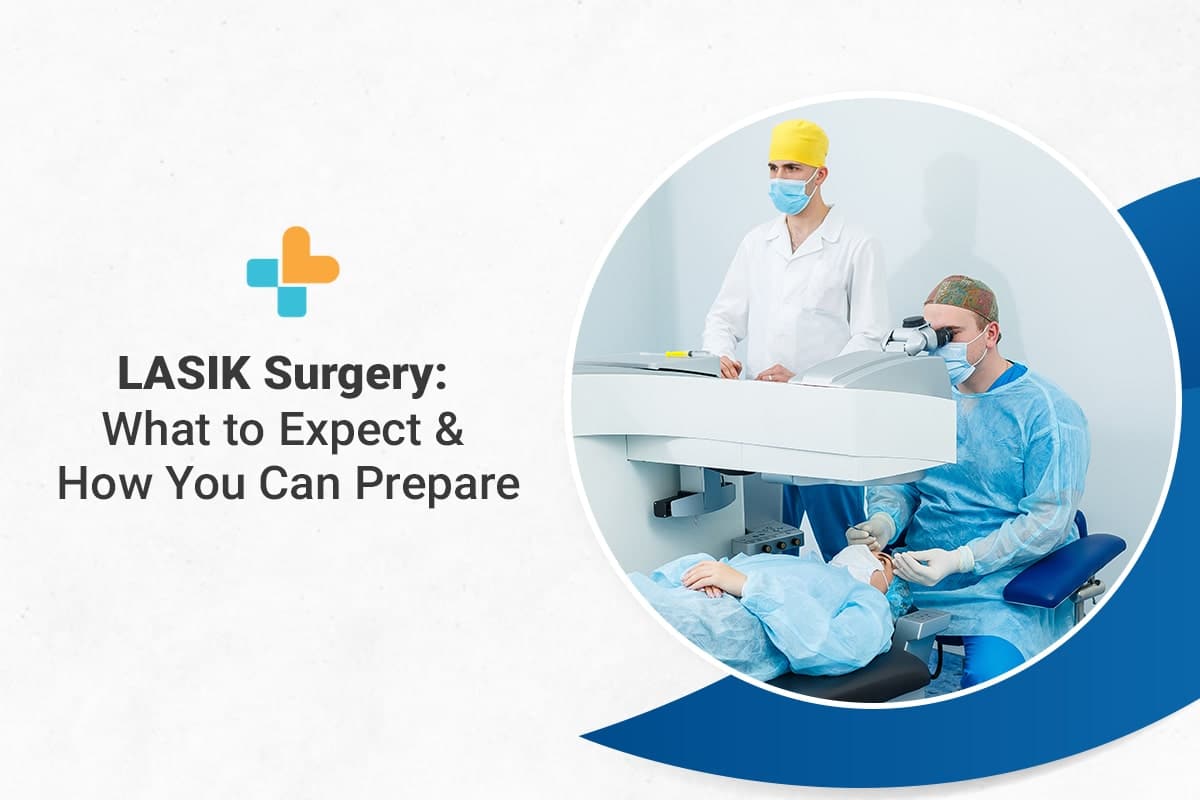The constant cleaning of the fogged-up lenses when you step out of an air-conditioned car or drink something warm; readjusting it every time you’re on the move; or struggling to find them with blurry vision. Glasses can be a pain at times. With everything going on in the world, you don’t want the hassle of eyeglasses to add to the stress. Do you? That’s why a lot of people opt for LASIK surgery for the eye.
If you’ve made the decision to undergo LASIK surgery for your eyes to get rid of your glasses, here’s everything you need to know about the surgery, the procedure, and how to prepare for it.
LASIK Surgery for Eyes
Laser In-Situ Keratomileusis, or LASIK, is a popular procedure for correcting eyesight in patients who are nearsighted, farsighted, or have astigmatism.
The focusing system of the human eye comprises the front surface (cornea) and the lens inside the eye, which are responsible for concentrating incoming light rays onto the retina’s surface.
The power of the cornea, the lens and the length of the eye need to be in sync for the images to focus on the retina; any mismatch in this system is referred to as a refractive error, and the result is a fuzzy image.
When there is a refractive error, one of the following three vision problems arises.
- Nearsightedness (Myopia): It is a condition where items that are far away are more difficult to see. This happens because light rays focus in front of the retina and blur distant vision.
- Farsightedness (Hyperopia): It is a condition where items that are close to you are more difficult to see than ones that are farther away. This happens because light focuses behind the retina instead of on it.
- Astigmatism: It is a condition where everything seems blurry. This happens because light rays meet at multiple focal points. Blurring both near and distant objects.
How Does LASIK Work?
LASIK (Laser In-Situ Keratomileusis) surgery uses an excimer laser (a type of ultraviolet laser), which is a highly specialized laser. It is used to treat refractive problems, improve vision, and reduce or eliminate the need for glasses or contact lenses. It is used underneath a corneal flap (in situ) to reshape the cornea (keratomileusis).
In most cases, the results of LASIK are permanent. However, you may notice some blurring due to slight regressions or natural changes in the eye as you get older. Nevertheless, because the blurring is so minor, most individuals don’t bother to do anything about it. In other cases, people may opt for eyeglasses for particular tasks, such as reading or driving, or opt for enhancement surgery.
How to Prep for LASIK Eye Surgery?
A majority of patients are satisfied with their refractive surgery results. However, there are risks associated with this procedure, as with any other medical procedure. Hence, you must talk to your eye doctor to understand the risks and limitations associated with LASIK.
Here are some crucial precautions to take before LASIK eye surgery
- If you wear rigid gas-permeable contact lenses, don’t wear them for at least 3 weeks before your procedure. And, for at least 3 days before the examination, don’t wear any other types of contact lenses.
- Refrain from wearing any form of eye make-up on the day of and the day before the procedure. Remove all traces of eye make-up from the eyelids and lashes.
- Avoid using scented lotions, perfume, cologne, hair spray, or gel on the day of the procedure, as this will influence the laser energy and the outcome.
- Make sure you wash your hair before the procedure, as you cannot wash it for 48 hours after the LASIK surgery.
- Make arrangements to get a ride home. You’ll need someone to drive you to and from your surgical location. You may still feel the effects of the drug you were given before surgery, and your vision may be blurry right after surgery.
What to Expect During LASIK Surgery?
The LASIK surgery time period should only be a few minutes per eye. However, your session might last for about 30 minutes in total. So, make sure you schedule the surgery at a time when you will not feel rushed and will be able to go home and relax afterwards. Here are a few other things you can expect:
- You will be lying on your back in a reclining chair for the procedure. Medication will be offered to help you relax.
- After administering numbing drops to your eye, your doctor holds your eyelids open using an instrument.
- During the procedure, you will be asked to keep your eyes focused on a point of light.
- Although you may experience some tingling and hear the laser, the procedure should be painless.
What to Expect After the LASIK Surgery?
After surgery, although you will be able to see, your eyesight will not be clear right away. Your eye doctor will ask you to place a see-through shield over your eye or ask you to sleep with one on to keep it protected while it heals. Your eyes may feel itchy or as though they are burning for a few hours. Special eye drops will be given to you to minimize dryness and help ease the pain.
The recovery time for LASIK surgery is around two to three months. Your odds of seeing better after surgery are partly determined by how strong your vision was prior to surgery.
Here are some precautions to take after LASIK surgery:
- Do not massage or squeeze your eyes, and do not rub or touch them.
- Be sure to wear the protective eyewear provided while sleeping or napping.
- Refrain from wearing eye make-up for at least one week. Applying creams or lotions around the eyes is not recommended.
- Avoid contact sports and strenuous exercise for at least one month after the surgery.
- For a few weeks, wear sunglasses while outside.
- Call your ophthalmologist right away if you are experiencing extreme discomfort, pain, discharge, or sudden haziness of vision.
- Finally, follow your doctor’s instructions and take your meds exactly as prescribed.
In conclusion, make sure you have all the information you need before the surgery to avoid any confusion. If you have any more questions or reservations regarding the procedure, feel free to get in touch with the best ophthalmologists for LASIK atAyu Health. You can call +91 – 6366 100 800 or head on over to our website to book an appointment.
Our Hospital Locations
Ophthalmology Surgery Hospitals in Chandigarh | Ophthalmology Surgery Hospitals in Bangalore | Ophthalmology Surgery Hospitals in Jaipur | Ophthalmology Surgery Hospitals in NCR | Ophthalmology Surgery Hospitals in Hyderabad
Our Doctors
Ophthalmology Surgery Doctors in Chandigarh | Ophthalmology Surgery Doctors in Bangalore | Ophthalmology Surgery Doctors in Jaipur | Ophthalmology Surgery Doctors in NCR | Ophthalmology Surgery Doctors in Hyderabad
About the Author

Dr. S. Goel
Dr. S. Goel is a renowned Internal Medicine Specialist currently practicing at Ayu Health, Bangalore. He is a Specialist in Internal Medicine, Diabetes HTN, Paediatric Care, and Family Medicine.




